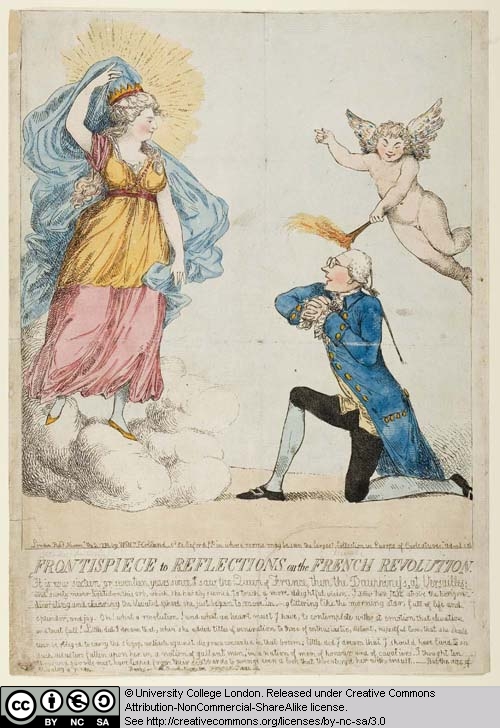4 Frontispiece to Reflections on the French Revolution

Attributed to
Frederick George Byron (1764 – 1792)
Frontispiece to
Reflections on the French Revolution, 1790
Etching with
hand-colouring
Published by William
Holland, No. 50 Oxford Street,
London, 2nd November 1790
Edmund Burke’s Reflections on
the Revolution in France was published on 1st November 1790 and provoked an
extraordinary number of responses including this print that was produced the
very next day. Print publishers in England
such as William Holland, who
published this caricature, and many others of the period, were eager to exploit
the sensational events, especially those occurring in England. In
this caricature, recently attributed to Frederick George Byron,
Edmund Burke is represented kneeling before Marie Antoinette, Queen of France.
Dressed in robes reminiscent of a Greek goddess and standing upon a cloud, Marie
Antoinette is the subject of Burke’s enraptured gaze.
Burke is here ridiculed for the admiration he displayed for
Marie Antoinette in Reflections on the Revolution in France. The caricature picks out
the famous passage, beginning, ‘It is now sixteen years since I saw the Queen
of France’ and ends with ‘I thought ten thousand swords must have leaped from
their scabbards to avenge even a look that threatened her with insult – But the
age of Chivalry is gone.’ Several months prior to its publication, Burke had
sent a draft to Philip Frances, a British
Statesman and Pamphleteer, who said of this passage, “all that you say of the
Queen is pure foppery.” Caricaturists wishing to sway people against Burke and
his opinions on the Revolution were quick to mock the praise lavished by him on
the Queen.
Licensed under the Creative Commons Attribution Non-commercial Share Alike 3.0 License
This resource has been released as an open educational resource (OER) on a Creative Commons 'Attribution Non-commercial Share Alike' license. This means that once downloaded, content can be modified and improved to complement a particular course. This requires, however, that improvements are recycled back into the OER community. All content present at the time of download must be accordingly credited and, in turn, novel content must be appropriately licensed.
